
Kerala HC Guidelines for Ensuring Legibility of Documents Submitted by Litigants and Lawyers
New directives aim to streamline the filing process and prevent delays in case adjudication
The Kerala High Court has recently issued guidelines for litigants and their lawyers regarding the submission of documents and records that are not legible.
The Division Bench, comprising Justices Anil K. Narendran and Harisankar V. Menon, issued these directions to prevent the registry from flagging defects in such instances.
To address issues arising from the submission of unreadable documents and to ensure clarity in the documents presented to the Court, the Bench issued several key directives, including:
* Documents submitted with writ petitions, writ appeals and original petitions must be complete and legible.
* If a document is not clearly legible, a typed copy, duly certified by the advocate or party-in-person, must be submitted alongside the original.
* If only a specific portion or paragraph of a document is illegible, the advocate or party-in-person must provide a typed copy of that portion or paragraph along with the original.
In such cases, the advocate or party-in-person must also provide an undertaking that a complete typed copy of the document will be submitted if directed by the Court.
* If a specific portion of a document is illegible but not crucial for adjudication (and a legible typed copy cannot be produced), the advocate or party-in-person may give an undertaking that the unreadable portion will not be relied upon.
The registry should number the matter based on this undertaking, subject to orders from the relevant Bench. After making a bold endorsement in the office notes, the registry is to list the matter before the Bench.
* Physical copies generated from the e-filing portal must meet legibility standards. The facilities provided by the e-Seva Kendra should be utilised for scanning and processing documents to ensure clarity.
The order was issued after the matter was referred to the Bench by Acting Chief Justice A. Muhamed Mustaque in July this year.
Writ Petitions
The case involved a series of writ petitions and appeals where the documents relied upon by the litigants and their lawyers were found to be illegible.
The Court was informed that lawyers and litigants often encounter difficulties in having their cases listed due to objections raised by the registry regarding the poor legibility of case documents.
Such delays in listing cases for adjudication undermine the efficiency and integrity of the judicial process, the Court was told.
Among the petitions and appeals referred to the Bench were cases where litigants sought to rely on illegible government communications.
It was noted that such government documents, particularly older ones, are often illegible from the outset.
In another case, documents were rejected by the registry due to dark shading or small font sizes.
The Court was also informed that, in many instances, it is impossible to rectify such defects or obtain a legible copy of the document in question.
Moreover, in some cases, requiring the litigant to submit a legible, typed copy of an illegible exhibit is impractical. For example, in an appeal challenging a decision of the Armed Forces Tribunal, the documents flagged as illegible spanned a large number of pages.
Consequently, the Court issued these directions to address the challenges.
For any enquiries or information, contact ask@tlr.ae or call us on +971 52 644 3004. Follow The Law Reporters on WhatsApp Channels.